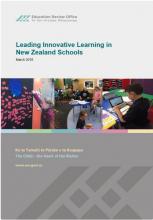Te Tāmata Huaroa: Te Reo Māori in English-medium Schooling
This report gives a snapshot of the current provision of te reo Māori teaching and learning in a representative sample of English-medium primary and secondary schools. The education sector is seen as an important lever in the Government’s Maihi Karauna strategy for language revitalisation.













